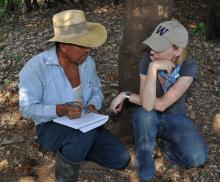The Law, Societies, and Justice Department offers undergraduate students a dynamic and engaged interdisciplinary liberal arts education focused on law, rights, and justice. LSJ faculty are trained in diverse social science fields, including anthropology, geography, political science, and sociology. This interdisciplinarity enables students to explore topics from a variety of perspectives. LSJ also offers a graduate certificate in socio-legal studies for PhD students from a variety of disciplines. The graduate program creates opportunities for scholars to present and engage research on topics related to socio-legal studies, social control, human rights, and humanitarianism. LSJ faculty are well known for their internationally recognized research and teaching excellence. Faculty members have published award-winning books and received numerous accolades, including the University of Washington Outstanding Teaching Award, Outstanding Public Service Award, Outstanding Mentorship Award, and more.
LSJ courses analyze the meaning of justice, the methods used in efforts to realize it, the politics of rights, and the complex roles that law and legal institutions play in structuring social life. Many courses analyze these issues in comparative perspective. Coursework emphasizes close reading of key texts, active classroom engagement with complex ideas, and the development of the capacity to develop and support arguments in oral and written communication. In this way, undergraduate LSJ courses enable students to develop the core skills of a liberal arts education rather than to prepare for a particular professional path. LSJ undergraduate alumni pursue a wide array of careers. Many work in various capacities in the legal field; others work in business, human rights, public policy, civil rights, education, and the non-profit sector, amongst others.
LSJ faculty integrate research, teaching and service in innovative and impactful ways, and, in so doing, create unique learning opportunities for students. Our prison-based education program, for example, enables LSJ majors to learn alongside prisoners and volunteer in prison under the supervision of faculty who have conducted extensive research in and on prisons. Our numerous study abroad courses provide students with opportunities to engage in experiential learning in settings ranging from South Africa and Amsterdam to Rome and Jamaica. In our Philanthropy Lab, students are invited to think deeply about how meaningful, justice-enhancing change occurs – and to donate over $100,000 to groups who are engaging in such work. And through our required internship course, LSJ majors have the opportunity to connect the issues discussed in their courses to the real-world, justice-related challenges faced by non-profits, government agencies and advocacy organizations throughout King County.
The faculty is comprised of internationally renowned scholars who conduct influential research on important questions pertaining to law, rights and justice. Although quite varied, LSJ faculty research shares some common features, including:
- Interdisciplinarity. LSJ not only includes scholars from different disciplinary backgrounds, but also promotes scholarship that is truly multi-disciplinary at the institutional level and individually interdisciplinary or transdisciplinary in character.
- A Global Perspective. Our study of law, rights and justice devotes particular attention to social scientific analyses of specific global forces that are emerging or accelerating in the contemporary world. A global perspective requires not only study of legal institutions and practices beyond U.S. borders, but also analysis of how global dynamics shape lawmaking and struggles over rights within national borders and of how traditional borders are blurred in the newest realms of transnational lawmaking.
- Legality: A Pluralistic Conceptual Framework. LSJ faculty work at the intersection of multiple theoretical understandings about law and legal systems. LSJ faculty tend to focus on authoritative practices as much as written rules; we examine the variable constructions and enactments of law’s meanings in practical activity, emphasizing law’s contingent and ambiguous character.
- Viewing Power from the Bottom Up. LSJ scholarship tends to take a self-conscious view of law from the bottom up – either analyzing how legal practices of dominant groups affect less powerful groups or how the latter groups challenge and struggle to transform the dominant order.
- Taking Rights Seriously. LSJ faculty engage in committed but also critical engagement (of multiple kinds) with the limits as well as promise of rights discourses, conventions, and struggles around the globe.
- Focus on Inequality. LSJ faculty analyze how inequality shapes struggles over law and justice, as well as how law and legal mobilization reshape inequality and reconfigure power differences in society.
